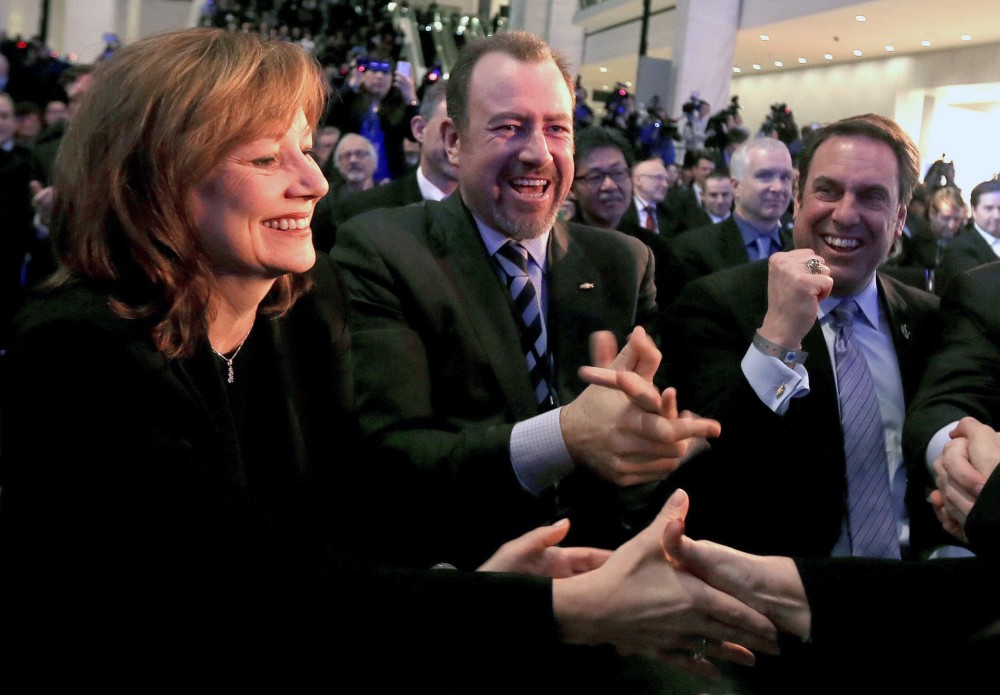By Nareerat Wiriyapong
Bangkok Post, Thailand
When Mary Barra took the helm at General Motors (GM) last month as the first female chief executive of any global car company, it raised questions about whether women are ready to take a bigger role in this male-dominated industry.
In fact, there are a number of women in leadership roles working alongside Ms Barra.
At the largest US car maker, more than 20% of its executives and 25% of its board of directors are women.
Meanwhile, women control about 85% of car-buying decisions, so being a woman in the market is proven to be an advantage, said Alicia Boler-Davis, the senior vice-president for global quality and customer experience.
“GM is very committed to diversity, and we know that our customer base is very diverse. We believe our employees should represent that as well. So we have a number of women who are in very key leadership roles, have done outstanding jobs and have helped the company be successful,” Ms Boler-Davis, who has been with GM for 20 years, said in Detroit.
She said former GM boss Dan Akerson has been a big supporter of women, recognising their contribution and providing challenging opportunities.
“I find it’s great to work for a company that is open and committed to opportunities for everyone. This is the company that we are. Having female executives is becoming a norm,” Ms Boler-Davis said.
After starting her career at GM in 1994 as a manufacturing engineer, she has held many positions in manufacturing, engineering and product development.
“Delivering results, getting the job done and being able to be counted on are important. When you lead the team, you inspire them to achieve results and listen to their feedback to develop your strategy and initiatives. Then they will become committed and they will help execute,” Ms Boler-Davis said.
“I believe you can learn something from everyone, so I am always open to learning. I don’t have all the answers, and I believe as long as we have answers from the team, people give their input, and they are comfortable with that. They will come up with the right answers.”
Ms Boler-Davis said it is not difficult for female executives to lead a team.
“People want to know their leader is capable and knowledgeable, and they will support them once they see that. I don’t think it matters to them if you are a woman or man,” she said.
Helen Emsley, executive director for global design and user experience of the car maker’s GMC division, said people are the most important factor in achieving success in management.
“If you have good facilities but your people are not happy and are not treated fairly, you will not succeed in anything,” said the British executive.
“I ask my team for their opinions and we make decisions together. My people know that I stand by them. This is important, and I make sure I won’t forget. People matter whoever they are. Everybody is good at something. You have just got to find what is the best thing in them.”
Mrs Emsley started her career at GM in Germany 25 years ago. Back then, there were very few women in design.
She later moved to the US, where things were more advanced in terms of female executives.
“My father told me when I was quite young that you should treat everybody like you want to be treated yourself even if they are the cleaning person,” she said.
“When people work at the top of the ladder, they forget what it’s like at the bottom. When you are at the bottom, you don’t want to be told all the time.”
Part of Mrs Emsley’s job is convincing teenage girls about opportunities for them in the automotive industry.
“Girls in school don’t think about the auto industry, while their parents don’t encourage them either. So we go out to high schools and tell them what they can do. There are a lot of jobs in the car industry in design, engineering and quality that girls don’t know about,” she said.
Emsley: People the main factor
“When I was in high school, a teacher wanted me to go to university to study maths and science, but I did not want to. It’s boring. I wanted to go to art school. My parents said it was OK. They had different thinking and supported me.
“My father said that although there was no money in design or art, he did not care as long as his daughter did the best she could and could pay her bills.”
Pamela Fletcher, GM’s chief engineer for electrified vehicles, said her major challenge is how to change transportation with the new opportunities and flexibility offered by electrification.
“How can we take advantage of that and make commuting and driving a better experience for people?” she said. “I think it’s one of the best jobs in the company. If you are an engineer, it’s inspiring to be a chief engineer. I really enjoy it.”
Asked whether it is difficult for a woman to lead a team of engineers, she replied: “I don’t think about it. You cannot think of any difference between a man and a woman. You have to focus on the job and do the best job you can. I have been fortunate to always work with some great teams.”
Ms Fletcher said delivering a great product really motivates workers.
“When people see you are genuinely focused on the product, that brings everybody togethernot that man working on everything or women working with the man,” she said. In fact, GM has a highly diverse workforce with people of both genders and various cultures.
“I have been very fortunate to work for a company that values many different opinions and perspectives. It’s a strength to listen to different viewpoints so that you end up with the best product portfolio,” said Ms Fletcher.
“I would say you should love what you do and always do the best job you can. You put these two things together and you will make a rewarding career for yourself. We spend a lot of time working, so it’s better to love what you do and do a great job.”
“The goal is to design and develop cars that people cannot live without. I want people to say: ‘I have to have that car’.”
Stefan Jacoby, an executive vice-president of Consolidated International Operations, also shared an interesting thought.
“Even when a man buys a car, he asks his spouse: ‘What do you think, should I buy this car?’ It’s like this all over the world. If the woman says no, then the man will not purchase the car,” he said.
“It has been a male-dominated industry, unfortunately. And I think we are still making a lot of mistakes. We do not understand the decision-makers and do not understand female demand.
“On top of that, I think it is important to have a management team that is diverse. I think this is inspiring. It is really bringing added value to have a mixed team with men and women.”
















































































































































































































































































































































































